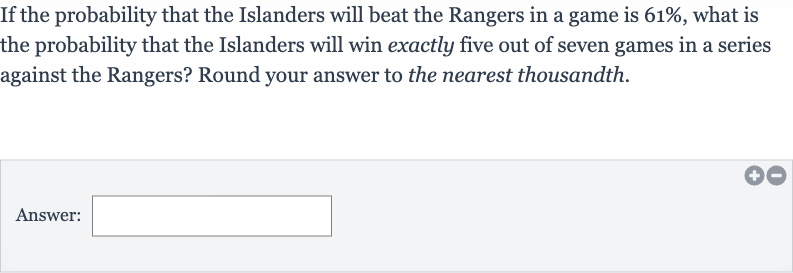AI tutor
Welcome to Bytelearn!
Let’s check out your problem:

If the probability that the Islanders will beat the Rangers in a game is , what is the probability that the Islanders will win exactly five out of seven games in a series against the Rangers? Round your answer to the nearest thousandth.Answer:
Full solution
Q. If the probability that the Islanders will beat the Rangers in a game is , what is the probability that the Islanders will win exactly five out of seven games in a series against the Rangers? Round your answer to the nearest thousandth.Answer:
- Identify formula and values: Identify the binomial probability formula and the values of , , and . The binomial probability formula is . Here, is the number of trials, is the number of successes, and is the probability of success on a single trial. For this problem: (since there are seven games), (since we want to find the probability of exactly five wins), (since the probability of the Islanders winning a single game is %).
- Calculate binomial coefficient: Calculate the binomial coefficient . The binomial coefficient is calculated using the formula . Substitute and into the formula: = = = .
- Calculate probability of five wins: Calculate the probability of exactly five wins . Using the binomial probability formula: Substitute the values we have calculated: .
- Solve probabilities: Solve and .Calculate :.Calculate :.
- Multiply values for probability: Multiply all the values together to find the probability .
- Round to nearest thousandth: Round the answer to the nearest thousandth.The probability rounded to the nearest thousandth is:.
More problems from Find probabilities using the binomial distribution
QuestionGet tutor help
QuestionGet tutor help
QuestionGet tutor help
QuestionGet tutor help
QuestionGet tutor help
QuestionGet tutor help
QuestionGet tutor help
QuestionGet tutor help
QuestionGet tutor help
QuestionGet tutor help
